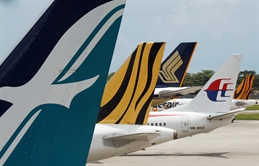
The International Air Transport Association (IATA) released data for global air cargo markets for June showing a 9.9% improvement in volumes over the pre-COVID-19 performance in June 2019 as the global economy continues to recover.
IATA said in a statement that this pushed the first half-year air cargo growth to 8%, its strongest first-half performance since 2017 (when the industry posted 10.2% year-on-year growth).
It said global demand for June 2021, measured in cargo tonne-kilometers (CTKs), was up 9.9% compared to June 2019.
“Air cargo is doing brisk business as the global economy continues its recovery from the COVID-19 crisis. With first-half demand 8% above pre-crisis levels, air cargo is a revenue lifeline for many airlines as they struggle with border closures that continue to devastate the international passenger business,” said Willie Walsh, IATA’s Director-General.
“Importantly, the strong first-half performance looks set to continue,” he added.
IATA said overall capacity, measured in available cargo tonne-kilometers (ACTKs), remained constrained at 10.8% below pre-COVID-19 levels due to the ongoing grounding of passenger aircraft.
Belly capacity was also down 38.9% on June 2019 levels, partially offset by a 29.7% increase in dedicated freighter capacity.
IATA noted that the cost-competitiveness and reliability of air cargo relative to that of container shipping have also improved during the period with the average price of air cargo relative to shipping has reduced considerably.
It said scheduling reliability of ocean carriers has also dropped, in May it was around 40% compared to 70-80% prior to the crisis.
Regional performance in June
IATA said regional variations in performance are significant — with North American carriers contributing 5.9 percentage points (ppts) to the 9.9% growth rate in June, Middle East carriers adding 2.1 ppts, European airlines with 1.6 ppts, African airlines 0.5 ppts and Asia-Pacific carriers 0.3 ppts, while Latin American carriers did not support the growth, shaving 0.5 ppts off the total.
Asia-Pacific airlines saw demand for international air cargo increase by 3.8% in June 2021 compared to the same month in 2019 although international capacity remained constrained, down 19.8%.
IATA said even though demand remains high, the region faces moderate headwinds from the lack of international capacity and manufacturing PMIs that are not as strong as in Europe and the US.
North American carriers posted a 23.4% increase in international demand in June citing "underlying economic conditions and favorable supply chain dynamics" which remained supportive for air cargo carriers in North America.
European carriers posted a 6.6% increase in international demand for the same period over June 2019, although capacity declined by 16.2%.
"Manufacturing PMIs are very strong in Europe indicating that market dynamics remain supportive for air cargo carriers in Europe," IATA said.
Meanwhile, Middle Eastern carriers posted a 17.1% rise in international cargo volumes boosted by strong performances on the Middle East to Asia and the Middle East to North America trade routes, though capacity in June was down 9%.
Latin American carriers reported a decline of 22.9% in international cargo volumes, which IATA said was "the worst performance of all regions" and a weakening of performance compared to the previous month.
International capacity also decreased 28.4% in June 2021 compared to June 2019. IATA said the region's weak performance is mostly due to local airlines losing market share to carriers from other regions.
Meanwhile, African airlines’ international cargo demand in June increased 33.5% compared to the same month in 2019. IATA said this was the strongest performance of all regions, but notably on small volumes (African carriers carry 2% of global cargo). International capacity in June also dropped by 4.9%.




